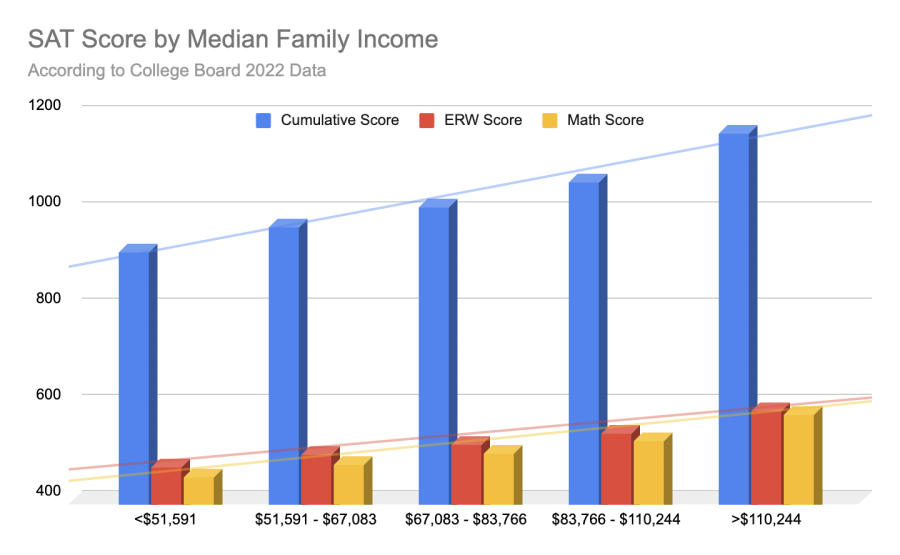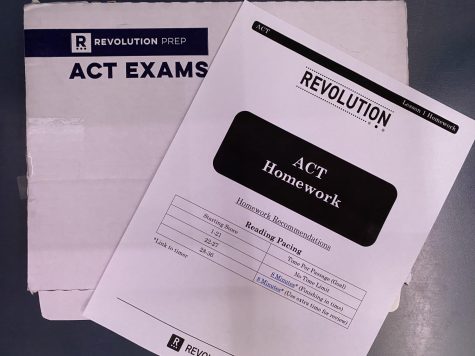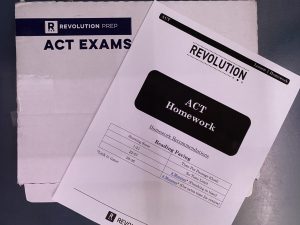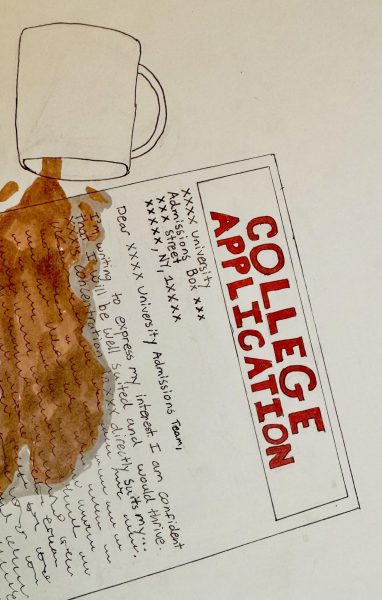The PSAT should suffer the same fate as the SAT
College Board’s Data of SAT test-takers from 2022 demonstrates a direct between higher family income and increased test scores.
December 5, 2022
The PSAT serves no purpose to students anymore. Not only is it useless, but it is actively harmful to the student population. While preparing students for the SAT/ACT may be crucial, preliminary testing–such as the PSAT and PreACT–is one of the worst ways of accomplishing this.
Proponents of the PSAT argue that a significant portion of its importance comes from allowing students to receive a scholarship from the National Merit Scholarship Program. However, an important issue arises due to this: socioeconomic inequality. In the past, the SAT has been heavily criticized for giving a substantial advantage to wealthy families who can pay for tutors and standardized testing preparation. College Board’s own data reveals that income and SAT scores are directly correlated, leading many colleges to no longer require SAT/ACT scores to apply. Unfortunately, College Board does not collect familial income data from PSAT takers; however, they gather data based on the students’ parents’ education. According to 2022 data, juniors from a parent with a graduate degree average a combined score of 1123, while juniors from parents with just a high-school diploma average a combined score of 878–a difference of 245 points. In fact, a junior with one or more parents with a graduate degree has a better chance of getting a higher score on the PSAT than a junior with an A (93-96) grade point average (1123 vs. 1099). Since a high PSAT score can lead to a National Merit Scholarship, it makes it even more challenging for low-income students to receive scholarships, even though they are the ones that need it the most.
Nevertheless, the elephant in the room is simply that the SAT and ACT will soon become obsolete. In the 2018-19 admissions process, 77% of students reported standardized test scores through the Common Application. However, in the 2020-21 admissions cycle, that number dropped to 40%. Additionally, more than 1,600 colleges and universities–including Harvard, Princeton, Stanford, and Yale–have made the SAT and ACT optional for admissions. This is again due to social equity issues. There is very little data that supports the claim that standardized testing is a good indicator of students’ success in college. The test also poses a financial burden for prospective college applicants since schools often do not emphasize preparing students for standardized tests. Therefore, a large majority of students will need to pay for outside tutoring or test preparation to succeed on the exams, which is a process that favors affluent families. Students who cannot pay for external resources are severely disadvantaged. Colleges and students are quickly learning that the SAT is the wrong way of determining students’ intelligence or success, making it almost entirely futile.
Since the PSAT is a shortened version of the SAT with fewer questions, it makes it difficult for students to properly gauge the actual length of the SAT. A much better alternative to the PSAT is mock SATs. Mock SATs are full-length practice tests. Also, mock SATs can be found online (and are even offered for free on the College Board website), making them readily accessible. Many organizations provide a massive catalog of mock SATs, meaning there is unlimited access compared to the singular annual PSAT.
Therefore, these tests allow students to take practice assessments anywhere, anytime. In contrast, the PSAT offers no flexibility, which forces students to go to test-taking areas on a specific date. Due to the rigid nature of the PSAT, students are often forced to miss multiple classes to take the PSAT, driving already busy students to struggle to stay ahead. Many students study for and take the SAT at different times, from their sophomore summers to the end of their junior years. Having a standardized date for preliminary testing creates issues for students who plan on taking the SAT at a different time than the traditional period.
Ultimately, the useless nature of the PSAT combined with the social equality issues makes the PSAT simply a tedious chore that students are forced to complete despite no benefit whatsoever.































